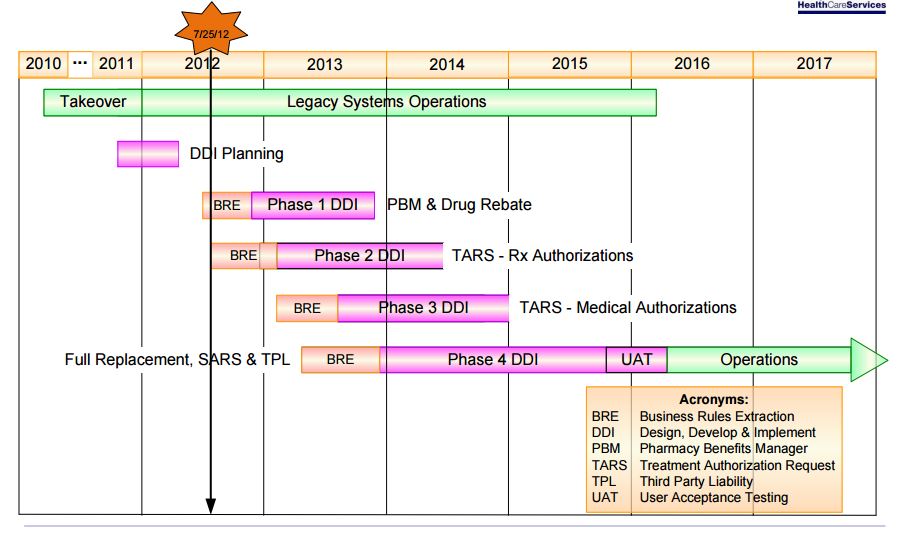$120 Million Settlement Ends Medical Claims Processing Failure
The medical claims processing computer system currently being used by Medi-Cal is more than 30 years old and is responsible for a whole host of functions.

- One medical claims processing technological project has been put to rest in the state of California. This project began in 2007 and has still failed to be completed, according to the California Healthline publication. The medical claims processing initiative was meant to help assist in processing claims for Medi-Cal, which is one of California's healthcare payment systems for low-income citizens.

Recently, the state’s Department of Health Care Services began a legal settlement with this particular project’s contractor Xerox Corporation. The contractor will be required to pay the state of California about $120 million for the failed medical claims processing computerization initiative.
California had spent $9 million on getting this project completed with $8.1 million coming from federal funds. At this point in time, Medi-Cal’s older computer system will have to handle the medical claims processing until a new replacement can be contracted out and built.
For the next three years, Xerox is under contract to continue running the older medical claims processing system for Medi-Cal. In a news release, the healthcare payment organization states that it is not the only establishment nor state that has had to undergo significant changes to improve Medicaid management information systems. The Centers for Medicare & Medicaid Services (CMS) have also had to evolve their medical claims processing technologies.
“Many other states as well as the federal Centers for Medicare and Medicaid Services (CMS) have adjusted their strategies on modernizing Medicaid management information systems to embrace a modular approach to procurement, design, and implementation,” the press release stated. “These changes have created an opportunity for DHCS to reevaluate the nearly decade-old design, development, and implementation strategies of the Replacement System and to reconsider the best course to ensure that California has a modern, robust, and sustainable system.”
“In light of these technological changes and evolving approaches to enterprise data systems, DHCS and Xerox have agreed to discontinue the remaining Replacement System DD&I, enabling DHCS to pursue a new procurement approach that would benefit from the most up-to-date technology and system design strategies available.”
The contractor Xerox has also had various issues with handling these renovation projects of Medicaid systems in the states of Texas, Alaska, and others. In fact, Xerox spokespeople have stated in the past that the company “did not expect to complete implementation of the Health Enterprise Platform in California.”
The medical claims processing computer system currently being used by Medi-Cal is more than 30 years old and is responsible for a whole host of functions from reimbursing physicians and determining beneficiary eligibility in the program to approving medical treatments and procedures. In fact, the 30-year-old program manages millions of transactions every day.
About two years ago, the Medi-Cal computer system held a backlog of about one million applications, which led to high numbers of patients from seeing their primary care physicians and it essentially blocked healthcare access for many low-income individuals. This was when the original issues with the medical claims processing system began.
The contractor Xerox had won the bid to replace the older computerized system in 2010 but has since failed to keep up its end of the bargain. After two years, the project was in trouble, California Healthline explains. Due to this, California began a corrective action plan to solve the issues associated with the developing medical claims processing project.
Since Xerox had planned to finish the project by the end of 2016 and isn’t close to being completed, the state had to reach a settlement and the contractor will now have to pay the state of California $120 million.
“The Parties now recognize that the pace of technological change for health enterprise data systems has significantly accelerated in the years since DHCS began procurement work in 2007 to replace CA-MMIS,” the settlement agreement stated. “In light of these technological changes and evolving approaches to enterprise data systems, the Replacement System design, development, and implementation and Replacement System operations are terminated for convenience. Xerox shall continue to operate and maintain CA-MMIS.”
The future will show whether California’s Medi-Cal organization will be able to reach a more fruitful conclusion to replacing its 30-year-old medical claims processing system.
Image Credits: Department of Health Care Services

